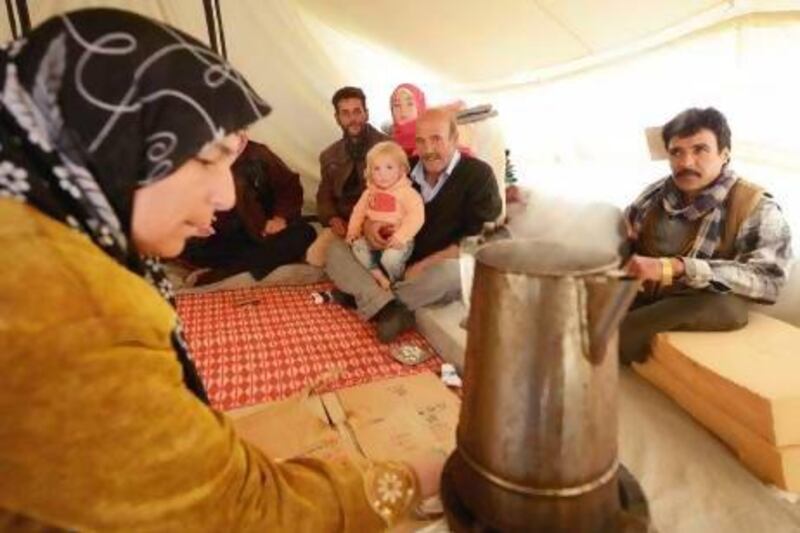KUWAIT CITY // An international meeting in Kuwait today aims to raise more than a billion dollars in humanitarian aid for Syria and avoid the political controversy a new UN relief plan has generated among supporters of Syria's rebel opposition.
Representatives from 59 countries are gathering in Kuwait City at the invitation of the UN Secretary General, Ban Ki Moon. Officials from Russia, as well as the deputy minister of foreign affairs of Iran, both countries that support the government of Syria's president, Bashar Al Assad, are expected to attend.
"When it comes to the humanitarian situation, all the countries agree on one fact: the Syrian people are in need of dire assistance," Sheikh Sabah Al Khalid Al Sabah, Kuwait's foreign minister and deputy prime minister, said yesterday:
"This is including the Syrian government itself, which has allowed UN agencies to operate and provide assistance. So there is a consensus. If there are political decisions, these are left to political forums."
The meeting in Kuwait's capital comes two days after envoys from 50 nations convened in Paris under the auspices of the French government to raise money and political support for groups fighting to overthrow Mr Assad.
It is organised around a US$1. 5 billion (Dh5.5bn) UN appeal unveiled last week that has come under heavy criticism from the National Coalition for Syrian Revolutionary and Opposition Forces. The UN relief plan was drafted in cooperation with the Syrian government and would rely on Damascus to provide coordination and help determine where the aid will go.
Syria's opposition coalition, which was not invited to the meeting, wants donor countries to avoid the UN agencies and, instead, channel their support through their new assistance coordination unit. The unit was set up at a Friends of Syria meeting in Morocco last month as part of a host of measures to boost the governing capacity of the opposition coalition.
Khaled Al Salih, a member of the group's executive board, said there is concern that the regime would benefit from the UN's humanitarian operation.
"We have an alternative to the UN. The international community can choose to rely on the coalition," he said. "We heard very good promises from the Gulf countries, from some of the EU countries, from the United States and the United Kingdom, that they are considering this."
Kuwait's foreign minister said how to direct funds was a decision that would be left up to the individual countries.
"This is something up to the donating countries to decide: how these grants will be channelled, whether through the UN specialised agencies or through popular committees or through official channels," Sheikh Sabah said. "Every country is responsible for the grants that it makes."
In Kuwait, where there is widespread popular support for the Syrian opposition, some opposition figures have reacted with anger to Kuwait's hosting of a conference linked to the UN-backed aid plan.
"The people's funds will be directed to serve the Syrian regime or to put pressure on the rebels," Waleed Al Tabtabaie, a former Salafist opposition MP, wrote in Arabic on his Twitter feed last week.
Independent Kuwaiti charities and NGOs, meeting a day in advance of the conference, announced that they had raised $182 million for Syria. Some of that aid will not be channelled through UN agencies, but to local partner organisations.
"The problem with the UN is that there is a contract with the regime," said Bader Bourhama, president of the Kuwaiti branch of Al Rahma International charity, which said it had raised $10m. "They have deals with the regime and we are not sure that 100 per cent of the aid will go to the Syrian people. So we cannot cooperate with the UN completely."
Across the groups meeting here, the mood is increasingly urgent, as the humanitarian needs have rapidly outstripped relief organisations' ability to respond.
"Syria is currently the worst human catastrophe in the world, and I am particularly anxious about the state of displaced Syrians residing in neighbouring countries Jordan, Lebanon, Turkey and Iraq, who receive thousands each day," the UN High Commissioner for Refugees' regional coordinator for Syrian refugees, Panos Moumtzis, told Kuwait's state news agency yesterday.
The UN humanitarian operations director John Ging also warned that the organisation would have to resort to cutting services and rations if it did not receive more funds soon.
Statistics from the UN Office for the Coordination of Humanitarian Affairs showed yesterday that the international body has received just 3.2 per cent of the funding needed to carry out operations from January to June.
The United States yesterday promised another $155m for Syrian relief. White House officials said the money was being used to immunise one million Syrian children, purchase winter supplies for a half million people, and to help alleviate food shortages.
edickinson@thenational.ae
twitter: For breaking news from the Gulf, the Middle East and around the globe follow The National World. Follow us





